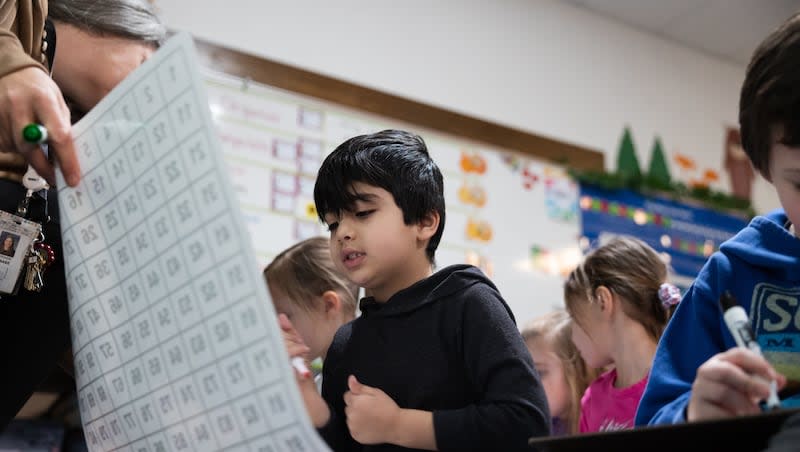Opinion: Don’t force all-day kindergarten on Utahns

Recently, a mother in an online group of Utah moms responded to Utah’s shift to full-day kindergarten by saying she felt that “we put too much pressure on kids academically at such a young age.”
Mothers like her are not alone. Many Utah parents with rising kindergarteners are concerned over whether regular half-day kindergarten will remain an option in Utah. Thanks to new legislation passed this cycle (HB517) the traditional half-day kindergarten option for parents might be saved.
The new law requires elementary schools to continue to offer traditional half-day kindergarten – where their school day is structured around half-day hours — if at least 18-19 parents register their children at their local school. If enough parents register for the half-day kindergarten program in their neighborhood school in the next couple of months, their child can attend.
Parents have good reason to be concerned about Utah public schools retaining regular half-day kindergarten for their 5- and 6-year-old kids. Data indicates starting kids too young with too much school may lead to hindered emotional and social development down the road.
For one, starting kids too young in school puts some at risk for being improperly diagnosed with ADHD and other developmental issues. One Harvard study found that children who started school a year earlier than their peers were more likely to be diagnosed with ADHD — even if they didn’t have it. In fact, the study of over 400,000 children from all 50 states found students were 30% more likely to be diagnosed with ADHD. Putting young kids in desks for long hours in a day can be a recipe for improper diagnoses and unwarranted medical interventions.
Research has also shown that any academic gains made in full-day kindergarten fade by about the third grade. That’s unfortunate, given that full-day kindergarten now costs Utah an estimated additional $60 million per year to fund. Part of the reason for the vanishing gains seems to be due to half-day kindergarteners making steeper gains in later grades. Researchers surmised more time with family offers these students more “cognitive stimulation.” Others suggested that starting kids too young soured their longer-term attitudes toward school.
Other successful countries with higher test scores than the United States start kindergarten later. For instance, Finland focuses on “creative play” until age 7. Only then does classroom instruction begin. Starting all kids in long hours of school at a young age is not necessary for academic success. In fact, U.S. News and World Report recently rated Utah fifth in the nation for education. Further, based on NAEP, ACT and SAT test scores, which allow for cross-state comparisons, a Forbes analysis of test scores rated Utah No. 2, second only to Massachusetts. These high scores were achieved with half-day kindergarten being the norm. This is particularly notable given that Utah is one of the five lowest spending states on education.
Further, the longer young children spend in non-relative, care the worse their behavior may be as they get older. Research from the National Institute of Child Health and Human Development panel study has found that young children who spend long hours in non-relative care are at a significantly higher risk for developing higher rates of aggression, disobedience, impulsivity and risk-taking — even when they are teenagers.
A large randomized controlled study (considered the gold standard of academic studies) found that students randomly assigned to receive formal pre-K services had more disciplinary infractions (and lower academic outcomes) by the sixth grade compared to peers not assigned to receive pre-K when they were younger. The authors hypothesize that long hours in institutional-based instruction could prevent kids from developing internal self-control. Perhaps parents may do a better job than even the most well-trained or well-intentioned teachers in teaching their children self-control and patience.
While it’s unclear how much of these studies including 4-year-olds would also apply to 5-year-olds, it’s reasonable to conclude that some of it would. Indeed, research specifically comparing third graders who had previously attended half-day or full-day kindergarten found consistent results. Students who had attended full-day kindergarten were less likely to be rated ready in emotional maturity and social competence by third grade. This isn’t to suggest that any time spent in pre-K is a problem, but that long hours of it may be too much for some kids.
Kids also need more free play, which half-day kindergarten allows. The American Academy of Pediatrics has warned “Despite the numerous benefits derived from play for both children and parents, time for free play has been markedly reduced for some children. This trend has even affected kindergarten children, who have had free play reduced in their schedules to make room for more academics,” (emphasis added).
Further, social psychologist Jonathan Haidt writes in his new book “Anxious Generation,” that “play is the work of childhood” and that studies show that children “come out socially, cognitively, and emotionally impaired when they are deprived of play.” Particularly informal, unstructured play.
There is an expanding zeitgeist that Utah needs to “catch up” with bigger states like California, New York or Virginia. Too many school board members think following in the footsteps of states that spend more and put their kids in desks for longer hours will improve student outcomes.
What they fail to consider is that Utah’s different approach to schooling is a feature, not a bug. Part of why Utah spends less than most other states and yet has some of the highest test scores in the country is because Utah is doing something right — including offering regular half-day kindergarten. Great school choice certainly may also be part of it. For those who care about the science, the evidence suggests that more time spent in kindergarten may do more harm than good for many Utah children. The last thing we should do is to make the traditional half-day kindergarten option more difficult for parents.
Emily Ekins is a vice president and director of polling at the Cato Institute.

